云南省昆明市滇池中学2014-2015学年高一下学期期中考试英语试题
- 格式:doc
- 大小:159.00 KB
- 文档页数:16
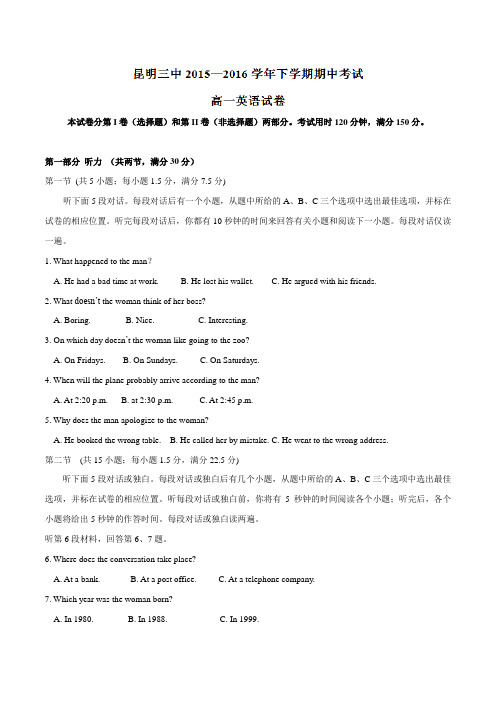
本试卷分第I卷(选择题)和第II卷(非选择题)两部分。
考试用时120分钟,满分150分。
第一部分听力(共两节,满分30分)第一节(共5小题;每小题1.5分,满分7.5分)听下面5段对话。
每段对话后有一个小题,从题中所给的A、B、C三个选项中选出最佳选项,并标在试卷的相应位置。
听完每段对话后,你都有10秒钟的时间来回答有关小题和阅读下一小题。
每段对话仅读一遍。
1. What happened to the man?A. He had a bad time at work.B. He lost his wallet.C. He argued with his friends.2. What doesn’t the woman think of her boss?A. Boring.B. Nice.C. Interesting.3. On which day doesn’t the woman like going to the zoo?A. On Fridays.B. On Sundays.C. On Saturdays.4. When will the plane probably arrive according to the man?A. At 2:20 p.m.B. at 2:30 p.m.C. At 2:45 p.m.5. Why does the man apologize to the woman?A. He booked the wrong table.B. He called her by mistake.C. He went to the wrong address.第二节 (共15小题;每小题1.5分,满分22.5分)听下面5段对话或独白。
每段对话或独白后有几个小题,从题中所给的A、B、C三个选项中选出最佳选项,并标在试卷的相应位置。
听每段对话或独白前,你将有5秒钟的时间阅读各个小题;听完后,各个小题将给出5秒钟的作答时间。
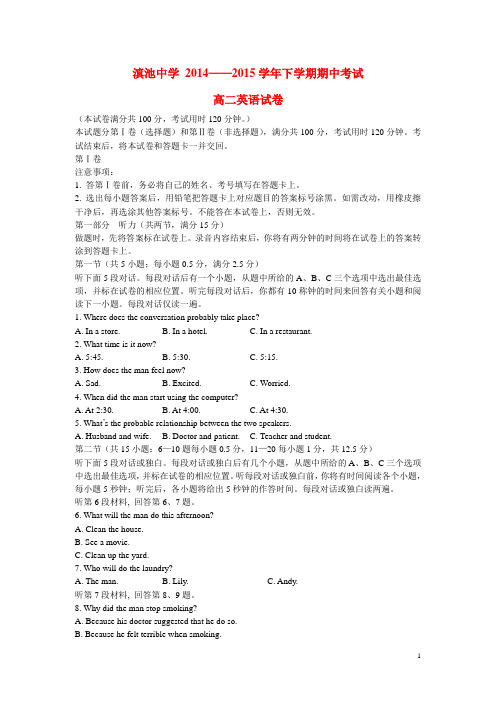
滇池中学2014——2015学年下学期期中考试高二英语试卷(本试卷满分共100分,考试用时120分钟。
)本试题分第Ⅰ卷(选择题)和第Ⅱ卷(非选择题),满分共100分,考试用时120分钟。
考试结束后,将本试卷和答题卡一并交回。
第Ⅰ卷注意事项:1. 答第Ⅰ卷前,务必将自己的姓名、考号填写在答题卡上。
2. 选出每小题答案后,用铅笔把答题卡上对应题目的答案标号涂黑。
如需改动,用橡皮擦干净后,再选涂其他答案标号。
不能答在本试卷上,否则无效。
第一部分听力(共两节,满分15分)做题时,先将答案标在试卷上。
录音内容结束后,你将有两分钟的时间将在试卷上的答案转涂到答题卡上。
第一节(共5小题;每小题0.5分,满分2.5分)听下面5段对话。
每段对话后有一个小题,从题中所给的A、B、C三个选项中选出最佳选项,并标在试卷的相应位置。
听完每段对话后,你都有10称钟的时间来回答有关小题和阅读下一小题。
每段对话仅读一遍。
1. Where does the conversation probably take place?A. In a store.B. In a hotel.C. In a restaurant.2. What time is it now?A. 5:45.B. 5:30.C. 5:15.3. How does the man feel now?A. Sad.B. Excited.C. Worried.4. When did the man start using the computer?A. At 2:30.B. At 4:00.C. At 4:30.5. What’s the probable relationship between the two speakers.A. Husband and wife.B. Doctor and patient.C. Teacher and student.第二节(共15小题:6—10题每小题0.5分,11—20每小题1分,共12.5分)听下面5段对话或独白。
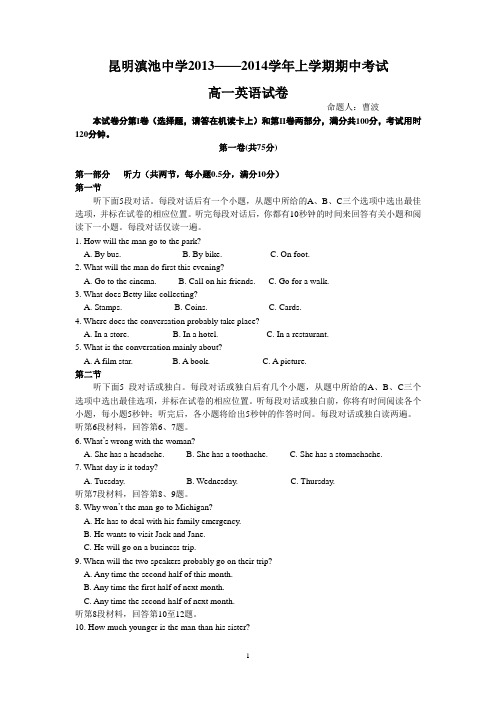
昆明滇池中学2013——2014学年上学期期中考试高一英语试卷命题人:曹波本试卷分第I卷(选择题,请答在机读卡上)和第II卷两部分,满分共100分,考试用时120分钟。
第一卷(共75分)第一部分听力(共两节,每小题0.5分,满分10分)第一节听下面5段对话。
每段对话后有一个小题,从题中所给的A、B、C三个选项中选出最佳选项,并标在试卷的相应位置。
听完每段对话后,你都有10秒钟的时间来回答有关小题和阅读下一小题。
每段对话仅读一遍。
1. How will the man go to the park?A. By bus.B. By bike.C. On foot.2. What will the man do first this evening?A. Go to the cinema.B. Call on his friends.C. Go for a walk.3. What does Betty like collecting?A. Stamps.B. Coins.C. Cards.4. Where does the conversation probably take place?A. In a store.B. In a hotel.C. In a restaurant.5. What is the conversation mainly about?A. A film star.B. A book.C. A picture.第二节听下面5 段对话或独白。
每段对话或独白后有几个小题,从题中所给的A、B、C三个选项中选出最佳选项,并标在试卷的相应位置。
听每段对话或独白前,你将有时间阅读各个小题,每小题5秒钟;听完后,各小题将给出5秒钟的作答时间。
每段对话或独白读两遍。
听第6段材料,回答第6、7题。
6. What’s wrong with the woman?A. She has a headache.B. She has a toothache.C. She has a stomachache.7. What day is it today?A. Tuesday.B. Wednesday.C. Thursday.听第7段材料,回答第8、9题。
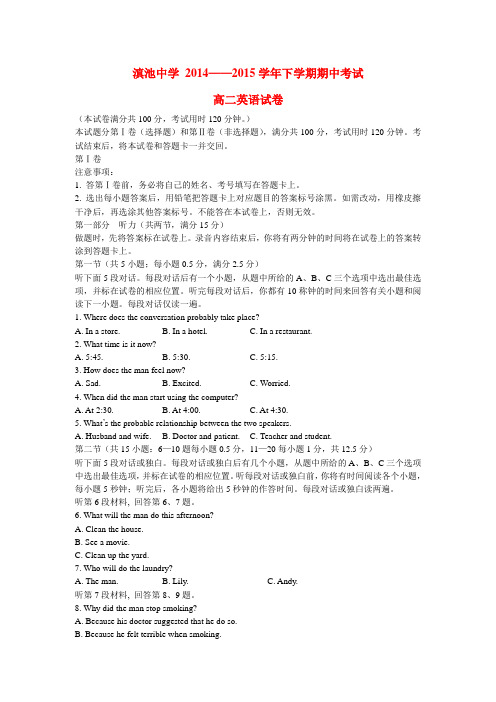
滇池中学2014——2015学年下学期期中考试高二英语试卷(本试卷满分共100分,考试用时120分钟。
)本试题分第Ⅰ卷(选择题)和第Ⅱ卷(非选择题),满分共100分,考试用时120分钟。
考试结束后,将本试卷和答题卡一并交回。
第Ⅰ卷注意事项:1. 答第Ⅰ卷前,务必将自己的姓名、考号填写在答题卡上。
2. 选出每小题答案后,用铅笔把答题卡上对应题目的答案标号涂黑。
如需改动,用橡皮擦干净后,再选涂其他答案标号。
不能答在本试卷上,否则无效。
第一部分听力(共两节,满分15分)做题时,先将答案标在试卷上。
录音内容结束后,你将有两分钟的时间将在试卷上的答案转涂到答题卡上。
第一节(共5小题;每小题0.5分,满分2.5分)听下面5段对话。
每段对话后有一个小题,从题中所给的A、B、C三个选项中选出最佳选项,并标在试卷的相应位置。
听完每段对话后,你都有10称钟的时间来回答有关小题和阅读下一小题。
每段对话仅读一遍。
1. Where does the conversation probably take place?A. In a store.B. In a hotel.C. In a restaurant.2. What time is it now?A. 5:45.B. 5:30.C. 5:15.3. How does the man feel now?A. Sad.B. Excited.C. Worried.4. When did the man start using the computer?A. At 2:30.B. At 4:00.C. At 4:30.5. What’s the probable relationship between the two speakers.A. Husband and wife.B. Doctor and patient.C. Teacher and student.第二节(共15小题:6—10题每小题0.5分,11—20每小题1分,共12.5分)听下面5段对话或独白。
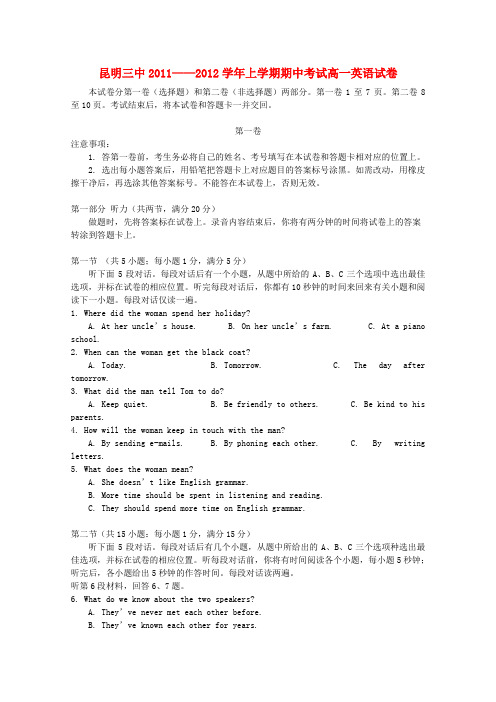
昆明三中2011——2012学年上学期期中考试高一英语试卷本试卷分第一卷(选择题)和第二卷(非选择题)两部分。
第一卷1至7页。
第二卷8至10页。
考试结束后,将本试卷和答题卡一并交回。
第一卷注意事项:1. 答第一卷前,考生务必将自己的姓名、考号填写在本试卷和答题卡相对应的位置上。
2. 选出每小题答案后,用铅笔把答题卡上对应题目的答案标号涂黑。
如需改动,用橡皮擦干净后,再选涂其他答案标号。
不能答在本试卷上,否则无效。
第一部分听力(共两节,满分20分)做题时,先将答案标在试卷上。
录音内容结束后,你将有两分钟的时间将试卷上的答案转涂到答题卡上。
第一节(共5小题;每小题1分,满分5分)听下面5段对话。
每段对话后有一个小题,从题中所给的A、B、C三个选项中选出最佳选项,并标在试卷的相应位置。
听完每段对话后,你都有10秒钟的时间来回来有关小题和阅读下一小题。
每段对话仅读一遍。
1. Where did the woman spend her holiday?A. At her uncle’s house.B. On her uncle’s farm.C. At a piano school.2. When can the woman get the black coat?A. Today.B. Tomorrow.C. The day after tomorrow.3. What did the man tell Tom to do?A. Keep quiet.B. Be friendly to others.C. Be kind to his parents.4. How will the woman keep in touch with the man?A. By sending e-mails.B. By phoning each other.C. By writing letters.5. What does the woman mean?A. She doesn’t like English grammar.B. More time should be spent in listening and reading.C. They should spend more time on English grammar.第二节(共15小题:每小题1分,满分15分)听下面5段对话。
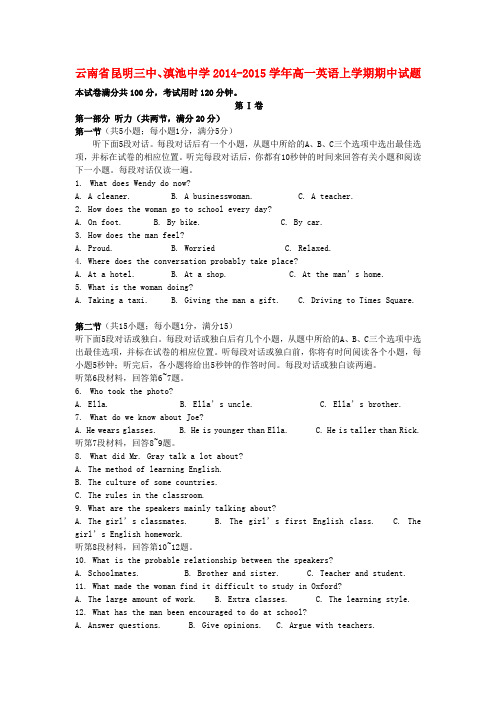
云南省昆明三中、滇池中学2014-2015学年高一英语上学期期中试题本试卷满分共100分,考试用时120分钟。
第Ⅰ卷第一部分听力(共两节,满分20分)第一节(共5小题;每小题1分,满分5分)听下面5段对话。
每段对话后有一个小题,从题中所给的A、B、C三个选项中选出最佳选项,并标在试卷的相应位置。
听完每段对话后,你都有10秒钟的时间来回答有关小题和阅读下一小题。
每段对话仅读一遍。
1.What does Wendy do now?A. A cleaner.B. A businesswoman.C. A teacher.2. How does the woman go to school every day?A. On foot.B. By bike.C. By car.3. How does the man feel?A. Proud.B. WorriedC. Relaxed.4. Where does the conversation probably take place?A. At a hotel.B. At a shop.C. At the man’s home.5. What is the woman doing?A. Taking a taxi.B. Giving the man a gift.C. Driving to Times Square.第二节(共15小题;每小题1分,满分15)听下面5段对话或独白。
每段对话或独白后有几个小题,从题中所给的A、B、C三个选项中选出最佳选项,并标在试卷的相应位置。
听每段对话或独白前,你将有时间阅读各个小题,每小题5秒钟;听完后,各小题将给出5秒钟的作答时间。
每段对话或独白读两遍。
听第6段材料,回答第6~7题。
6.Who took the photo?A. Ella.B. Ella’s uncle.C. Ella’s brother.7.What do we know about Joe?A. He wears glasses.B. He is younger than Ella.C. He is taller than Rick. 听第7段材料,回答8~9题。
2014-2015学年云南省滇池中学高一下学期期中考试英语一、阅读理解The arts, especially music, should be part of every school's lessons at every grade level. Students would be much smarter if they had some musical experience. They could improve their classroom skills, like paying attention and following directions. People develop all these skills when they learn music. Making music also lets children use their imagination. It provides students with a chance to try out their ownideas. Music not only makes children better students, but also gives them something positive to do. In a music program, children can be part of a band instead of joining a gang (团伙). Parents can enjoy listening to their children's music instead of seeing them glued to a computer or TV screen. In a school band, students get to be part of a team. They can get along well with old friends and make new friends through music. Music builds self-confidence, too. It gives children a sense of achievement and success. Making music is something for them to be proud of, and it lets kids practice performing in front of an audience. Music gives children an opportunity for self-expression, and that helps develop theirself-confidence. Once again, music is important because it can make children better students, give them something positive to do, and build their character. That is why music should be offered in every single grade in every school.1.According to the passage, music could make students smarter by__________.A.improving their classroom skills and paying attentionB.improving their classroom skills and imaginationC.improving their attention, direction and imaginationD.learning music, making music and trying out their own ideas2.What does the underlined phrase "glued to" in the second paragraph mean?A.unwilling to turn onB.always lookingC.unwilling to leaveD.always playing3.The third paragraph mainly tells us that music could __________.A.give children self-expression and self-confidenceB.bring to children achievement and successC.give children something to be proud ofD.develop children's self-confidence4.What's the best title of this passage?A.Music is a must as a course at schoolB.Music builds children's self-confidenceC.Music makes students much smarterD.Learning music and making musicWith golden sunshine and a gentle breeze (微风), autumn is the most beautiful seasons in the year. This is a great time to go outside and have fun. Go to a valley to see red maple trees , go and pick fruit in an orchard or find an open field to fly your kite in.However, for many high school students, these great activities may be just a dream. With plenty of work to do, they spend all their hours indoors, struggling for a high mark in their exams. Of course, study is one of the most important things for teenagers. But life is definitely much more than that.Sometimes we spend so much time studying that we forget how to make life wonderful. In doing so, we lose the real purpose of life —to be a valuable and happy person. To enjoy just how great it is to be alive, we have to put down our books and pens and look around us. Students, take some exercise to improve your health, talk with your parents and friends for understanding and walk around outside to refresh (振作) your body and mind.Going out and enjoying the beautiful countryside often helps our creativity in our work. Chinese craftsman, Lu Ban created a saw to help woodworkers. But if he hadn't walked outside, he would not have been inspired by a kind of toothed (锯齿状的) grass. We could also suppose if Newton hadn't rested under that apple tree, then he wouldn't have been hit by an apple, and his classic (经典的) theories would not have come out.Going out is not only a break from hard work, but a chance to add to life experience. So come on, give your brain a good rest. Step out of the books and get your bag ready for an autumn outing. We are sure you will get much more than knowledge from the exciting journey.5.In which paragraph does the writer make a summary about his opinion?A.Paragraph 1.B.Paragraph 2.C.Paragraph 5.D.Paragraph 4.6.Why is going out a dream for many high school students?A.They are unhappy to do so.B.Their parents don’t allow them to do so.C.They have too much work to do for getting high marks in the exams.D.They think study is the most important thing for them.7.Which of the following ISN’T the reason for high school students’ going out?A.To improve their health.B.To invent a new product.C.To develop their creativity.D.To refresh themselves.Jerry was a unique manager because he had several waiters who had followed him around from restaurant to restaurant. The reason the waiters followed Jerry was because of his attitude. He was a natural motivator. If an employee was having a bad day, Jerry was there telling the employee how to look on the positive side of the situation.Seeing this style really made me curious, so one day I went up to Jerry and asked him, “I don’t get it! You can’t be a positive person all of the time. How do you do it?” Jerry replied, “Each morning I wake u p and say to myself, ‘Jerry, you have two choices today. You can choose to be in a good mood or you can choose to be in a bad mood.’ I choose to be in a good mood. Each time something bad happens, I can choose to be a victim or I can choose to learn from it. I choose to learn from it. Every time someone comes to me complaining, I can choose to accept their complaining or I can point out the positive side of life. I choose the positive side of life. The bottom line: It’s your choice how you live your life.” I reflected on what Jerry said. Later, I left the restaurant industry to start my own business. We lost touch, but I often thought about him when I made a choice about life.Several years later, I heard that Jerry did something you are never supposed to do in a restaurant business: he left the back door open one morning and was stopped at gun point by three armed robbers. While trying to open the safe(保险箱), he forgot the password, nervous. The robbers shot him. Luckily, Jerry was found rather quickly and rushed to the local hospital. After 18 hours of surgery and weeks of intensive care, Jerry left hospital with fragments(碎片)of the bullets(子弹) still in his body.I saw Jerry about six months after the accident. When I asked him how he was, he replied, “The fi rst thing that went through my mind was that I should have locked the back door,” Jerry replied. “Then, as I lay on the floor, I remembered that I had two choices: I could choose to live, or I could choose to die. I chose to live.” “Weren’t you frightened? Did you lose consciousness(知觉)?” I asked. Jerry continued, “The doctors and nurses were great. They kept telling me I was going to be fine. But when they wheeled me into the emergency room and I saw the expressions on the faces of the doctors and nurses, I got really frightened. I knew I needed to take action.”“What did you do?” I asked. “Well, there was a big, strong nurse shouting questions at me,” said Jerry. “She asked if I was allergic (过敏的)to anything. ‘Yes,’ I replied. The doctors and nurses stoppe d working as they waited for my reply. I took a deep breath and shouted, ‘Bullets!’ Over their laughter, I told them. ‘I am choosing to live. Operate on me as if I am alive, not dead.’”Jerry lived thanks to the skill of his doctors, but also because of his amazing attitude. I learned from him that every day we have the choice to live fully.8.The author left Jerry’s restaurant industry because he________.A.wanted to start business on his ownB.was afraid of another robbery laterC.was not equal to the job any longerD.didn’t get along well with others9.Why was Jerry shot? ________.A.Because he left the back door openB.Because he refused to open the safeC.Because he didn’t open the safe in timeD.Because he pretended to forget the password10.What was Jerry really afraid of in the emergency room? ________.A.The doctors and nurses gave him up.B.He decided to take action to live again.C.He saw many doctors and nurses waiting there.D.He might not be saved by doctors and nurses.11.From the passage we can learn that Jerry was ________.A.no longer positive to his life after the operationB.optimistic even when things were at their worstC.influenced by all his colleagues in many waysD.badly injured and stayed in hospital for six monthsA new study has found some secrets of people’s understanding of large numbers. Researchers studied a group of people who were born deaf and never learned any spoken language or a formal sign language, but they have developed a gesture system to communicate with people around them. The gestures let them express approximate amounts, but not exact numbers.“Up to three, they’re fine,” says Elizabet Spaepen, a researcher at the University of Chicago and an author of the study. “But past three, they start to fall apart.” In one test, Spaepen would knock her fist against a study participant’s fist a certain number of times and then ask them to respond with the same number of knocks. “If I were to knock four times on their fist, they might knock on my fist five times,” she says.The finding offers a clue to just how much language affects our understanding of numbers. That has been a big question since 2004, when other researchers published data on two tribes in the Amazon whose members also lack words for big numbers. “What they have are words that mean one and two,” Spaepen says, “and then they have a word to mean many.”Members of the Amazonian tribes also had trouble matching numbers larger than three or four. But some scholars felt that these earlier studies failed to prove that language was the reason. They pointed out that the tribes lived in groups that didn’t use money and had no need for exact numbers.The new research appears to answer that criticism. “It proves that the kinds of problems in understanding numbers that we found in the Amazonian tribes are not due to just the cultural or environmental circumstances,” says Peter Gordon of Columbia University, one of the researchers involved in the earlier studies.12.The participants of the new study ______.A.cannot communicate with one anothere a formal sign language to express numbersC.have some physical disabilitye from a distant tribe13.According to the passage, the new study _______.A.ignored the cultural influence on the participantsB.is doubted by many peopleC.has found it is harder to learn numbers than learning a sign languageD.has shown that our understanding of numbers is influenced by our mastering of language.14.The tribes involved in earlier studies _________.A.often dealt with big numbers.B.didn’t use money in their daily lifeC.didn’t have their own languageD.often made trouble for the researchers15.What can we learn from the last paragraph?A.Peter Gordon is a researcher of the University of Chicago.B.Peter Gordon thinks less of the new study than his earlier studies.C.Peter Gordon believes people’s understanding of numbers has nothing to do with cultural circumstances.D.Peter Gordon is in favor of the finding of the new study.M: Overseas Travel Agency. May I help you?W: Yes, my husband and I are planning a vacation to an island. 16M: Certainly. Off the top of my head, I would suggest the island of Bali.W: 17M: At this time of year it rains a lot in most regions, but it is the dry season in Bali. 18And I must say that the shopping is absolutely great !W: 19Jason loves to dive and I love to shop and eat. Can you tell me how much it will cost for the two of us?M: It will take me a day or two to get accurate prices, but I will call you as soon as I do.W: Thank you. 20M: I'll need your credit card number to make a reservation, but you won't actually have to pay for it until you get there.W: That sounds great.A. Why Bali?B. That sounds amazing!C. You can fly to the island.D. Do you have any recommendations?E. Will we have to pay for it right away?F. There are many scenic spots on the island.G. Also, Bali is known for its surfing and diving.三、语法填空Valentine’s Day is the time of the year when couples show their love for each other by sending cards,flowers and chocolates. Its origins are 21(clear) and hidden in the river of time. Nobody knows exactly 22St. Valentine was,although some historians suggest he was 23Roman killed in the third century AD by a Roman Emperor. It is said that the first 24(record) Valentine’s card was sent by the imprisoned Duke of Orleans in 1415. 25is believed that he tried to find comfort from his imprisonment by writing love poems to his wife.Now,Valentine’s Day 26(celebrate) in many countries around the world. However, the traditions often differ from place to place. In Japan,for example,it is normal 27the woman to send chocolatesto the man, 28in South Korea April 14th is known as “Black Day” and is when the unfortunate men who r eceived nothing on Valentine’s Day gather to eat noodles and show sympathy for each other.Technological 29(develop) have also played their part 30keeping Valentine’s Day relevant in the 21st century. Valentine’s e-cards have been very popular in recent years.四、书面表达31.下面是21世纪报中学生英语双语版(Student Times )刊登的一封读者来信,请你以编辑Henry 的身份给这位中学生写封回信。
高中英语真题:2014——2015学年下学期期中考试本试卷分第I卷(选择题)和第Ⅱ卷(非选择题)两部分,第I卷1—7页,第Ⅱ卷7-8页。
满分100分,考试用时120分钟。
注意事项:1.答题前填写好自己的姓名、班级、考号等信息;2.请将答案正确填写在答题卡上。
第I卷(选择题,共70分)第一部分听力(共两节,满分20分)第一节(共5小题;每小题1分,满分5分)听下面5段对话。
每段对话后有一个小题,从题中所给的A、B、C三个选项中选出最佳选项,并标在试卷的相应位置。
听完每段对话后,你都有10秒钟的时间来回答有关小题和阅读下一小题。
每段对话仅读一遍。
1. What is the man doing?A. Waiting to see a doctor.B. Examining a patient.C. Mak ing a date.2. Where are the speakers?A. In a car.B. In a lift.C. In a class room.3. What does the woman want the man to do on Sunday?A. Celebrate her mum’s birthday.B. Eat out for the day with her.C. Help David move house.4. What does the woman think of Mr. Smith’s lessons?A. Interesting.B. Funny.C. H elpless.5. What are the speakers probably talking about?A. A novel.B. A film.C. A writer.第二节(共15小题;每小题1分,满分15分)听下面5段对话或独白。
每段对话或独白后有几个小题,从题中所给的A、B、C三个选项中选出最佳选项,并标在试卷的相应位置。
昆明三中、滇池中学 2014-2015 学年上学期期中考试初三英语试卷本试卷满分共 100 分,考试用时 120 分钟。
第一部分 听力(共四节,满分 20 分)命题人:丁志华第一节 听句子,选出与所给句子内容相符的图画。
听音前你有 10 秒钟读题时间,注意听两遍。
(共 5 小题,每小题 1 分,满分 5 分)1.AB C2.AB C 3.4.AB C 5.A B C第二节根据所听到的句子,选出恰当的应答语。
听音前你有 10 秒钟的读题时间,注意听两遍。
(共5 小题,每小题1 分,满分5 分)6.A. Three hours.7.A. Thank you! B. On Sunday.B. The same to you!C. Twice a week.C. Me, too.8. A. Nov. 14th. B. Nov. 14th, 2014. C. Friday.9. A. I am Jenny. B. This is Jenny speaking. C. You can’t.10. A. I don’t think so. B. I’m sorry to hear that. C. OK.第三节听对话及问题,选择最佳答案。
听音前你有10 秒钟的读题时间,注意听两遍。
(共5 小题,每小题1 分,满分5 分)11.A. Apples. B. Lemons. C. Oranges.12.A. On Saturday afternoon. B. On Sunday morning. C. On Sunday afternoon.13.A. Because he is hard-working. B. Because the test is coming. C. Because he can pass thetest.14.A. Next to the supermarket.B.Across from the pizza house.C.Across from the supermarket.15.A. A chicken hamburger. B. A beef hamburger. C. Chicken and beef.第四节听短文,根据短文内容回答问题。
昆明滇池中学2015-2016学年下学期高一年级期中考试英语试卷命题:岳廷芳第I卷注意事项:1. 本试卷分第I卷(选择题)和第II卷(非选择题)两部分。
2. 答题前,考生务必将自己的姓名、准考证号填写在答题卡相应的位置。
3. 全部答案在答题卡上完成,答在本试卷上无效。
第I卷第一部分听力(共两节,满分30分)做题时,先将答案标在试卷上。
录音内容结束后,你将有两分钟的时间将试卷上的答案转涂到答题卡上。
第一节(共5小题; 每小题1.5分, 满分7.5分)听下面5段对话。
每段对话后有一个小题,从题中所给的A、B、C三个选项中选出最佳选项,并标在试卷的相应位置。
听完每段对话后,你都有10秒钟的时间来回答有关小题和阅读下一小题。
每段对话仅读一遍。
1. What is the woman?A. A student.B. A secretary.C. A teacher.2. What does the woman say about Tom?A. He works hard.B. He is clever.C. He is popular.3. What are the speakers talking about?A. Where to meet Mr. Jackson.B. Whether to call Mr. Jackson.C. When to meet Mr. Jackson.4. How will the man go to the airport tomorrow?A. By bus.B. By taxi.C. By car.5. Where will the woman go tonight?A. To a party.B. To a theatre.C. To the man’s home.第二节(共15小题; 每小题1.5分, 满分22.5分)听下面5段对话或独白。
每段对话或独白后有几个小题,从题中所给的A、B、C三个选项中选出最佳选项,并标在试卷的相应位置。
昆明滇池中学2014----2015 学年下学期期中考高一英语试卷本试卷满分共100分,考试用时120分钟。
第Ⅰ卷注意事项:1.答第Ⅰ卷前,考生务必将自己的姓名、考生号填写在答题卡上。
2.选出每小题答案后,用铅笔把答题卡上对应题目的答案标号涂黑。
如需改动,用橡皮擦干净后,再选涂其他答案标号。
不能答在本试卷上,否则无效。
3.第一部分听力(共两节,满分15分)做题时,先将答案标在试卷上。
录音内容结束后,你将有两分钟的时间将在试卷上的答案转涂到答题卡上。
第一节(共5小题;每小题0.5分,满分2.5分)听下面5段对话。
每段对话后有一个小题,从题中所给的A、B、C三个选项中选出最佳选项,并标在试卷的相应位置。
听完每段对话后,你都有10称钟的时间来回答有关小题和阅读下一小题。
每段对话仅读一遍。
1. How does the man feel about the movie?A. He only likes its story.B. He likes it very muchC. He doesn‟t like it at all.2. What will the man do with his old puter?A. Sell it to the man.B. Give it to his brother.C. Keep it himself.3. What‟s the probable relationship between the two speakers?A. Mother and son.B. Sister and brother.C. Teacher and student.4. What does the man eat in the end?A. An apple.B. A banana.C. A pear.5. Where is the man‟s father?A. In his study.B. In the garage.C. In his room.第二节(共15小题:6—10题每小题0.5分,11—20每小题1分,共12.5分)听下面5段对话或独白。
每段对话或独白后有几个小题,从题中所给的A、B、C 三个选项中选出最佳选项,并标在试卷的相应位置。
听每段对话或独白前,你将有时间阅读各个小题,每小题5秒钟;听完后,各小题将给出5秒钟的作答时间。
每段对话或独白读两遍。
听第6段材料, 回答第6、7题。
6. Where is the library?A. Beside the new playground.B. In front of the new playground.C. Behind the new teaching building.7. What do we know about Ann?A. She doesn‟t like swimming.B. She has a colorful college life.C. She works really hard in college.听第7段材料, 回答第8、9题。
8. How long did the man play football this afternoon?A. Three hours.B. Four hours.C. Five hours.9. Why didn‟t the man go for dinner with his friends?A. Because he still wanted to play.B. Because he was not hungry.C. Because he was too tired.听第8段材料, 回答第10至12题。
10. How was the weather yesterday?A. Hot.B. Cool.C. Cold.11. What did the man do yesterday?A. He visited a friend.B. He stayed at home all day.C. He went swimming with a friend.12. What do we know about the man?A. He still feels terrible now.B. He feels very hungry now.C. He hasn‟t taken any pills yet.听第9段材料, 回答第13至16题。
13. When will the man leave for Canada?A. Next Monday.B. This Sunday.C. This Saturday.14. What‟s the man worried about?A. How to make some friends.B. How to get along well with others.C. How to make others understand him.15. What does the woman think of the man?A. Hard working.B. Easy-going.C. Outgoing.16. What do we know about the woman?A. She is afraid to introduce herself to others.B. She tries to remember people‟s names.C. She is bad at making a conversation.听第10段材料, 回答第17至20题。
17. How long have the speaker and Josh been friends?A. Over a year.B. About a month.C. About half a year.18. What did Josh want to do that day?A. Watch a movie alone.B. Go back to school.C. Watch her older sister‟s performance.19. How did the speaker feel when his mother saw him?A. Excited.B. Sad.C. Nervous.20. What did the speaker learn in the end?A. Josh was not a good friend.B. Friends needed time of their own.C. Josh no longer wanted to be his friend.第二部分阅读理解(共两节,满分30分)第一节(每小题1.5分)AThe arts, especially music, should be part of every school's lessons at every grade level. Students would be much smarter if they had some musical experience. They could improve their classroom skills, like paying attention and following directions. People develop all these skills when they learn music. Making music also lets children use their imagination. It provides students with a chance to try out their own ideas.Music not only makes children better students, but also gives them something positive to do. In a music program, children can be part of a band instead of joining a gang (团伙). Parents can enjoy listening to their children's music instead of seeing them glued to a puter or TV screen. In a school band, students get to be part of a team. They can get along well with old friends and make new friends through music.Music builds self-confidence, too. It gives children a sense of achievement and success. Making music is something for them to be proud of, and it lets kids practice performing in front of an audience. Music gives children an opportunity for self-expression, and that helps develop their self-confidence.Once again, music is important because it can make children better students, give them something positive to do, and build their character. That is why music should be offered in every single grade in every school.21. According to the passage, music could make students smarter by_______________. A.improving their classroom skills and paying attentionB.improving their classroom skills and imaginationC.improving their attention, direction and imaginationD.learning music, making music and trying out their own ideas22. What does the underlined phrase "glued to" in the second paragraph mean? A.unwilling to turn on B.always lookingC.unwilling to leave D.always playing23. The third paragraph mainly tells us that music could _______________.A.give children self-expression and self-confidenceB.bring to children achievement and successC.give children something to be proud ofD.develop children's self-confidence24. What's the best title of this passage?A.Music is a must as a course at schoolB.Music builds children's self-confidenceC.Music makes students much smarterD.Learning music and making musicBWith golden sunshine and a gentle breeze (微风), autumn is the most beautiful seasons in the year. This is a great time to go outside and have fun. Go to a valley to see red maple trees , go and pick fruit in an orchard or find an open field to fly your kite in.However, for many high school students, these great activities may be just a dream. With plenty of work to do, they spend all their hours indoors, struggling for a high mark in their exams. Of course, study is one of the most important things for teenagers. But life is definitely much more than that.Sometimes we spend so much time studying that we forget how to make life wonderful. In doing so, we lose the real purpose of life —to be a valuable and happy person. To enjoy just how great it is to be alive, we have to put down our books and pens and look around us. Students, take some exercise to improve your health, talk with your parents and friends for understanding and walk around outside to refresh (振作) your body and mind.Going out and enjoying the beautiful countryside often helps our creativity in our work. Chinese craftsman, Lu Ban created a saw to help woodworkers. But if he hadn't walkedoutside, he would not have been inspired by a kind of toothed (锯齿状的) grass. We could also suppose if Newton hadn't rested under that apple tree, then he wouldn't have been hit by an apple, and his classic (经典的) theories would not have e out.Going out is not only a break from hard work, but a chance to add to life experience. So e on, give your brain a good rest. Step out of the books and get your bag ready for an autumn outing. We are sure you will get much more than knowledge from the exciting journey. 25. In which paragraph does the writer make a summary about his opinion? A.Paragraph 1. B.Paragraph 2.C.Paragraph 5. D.Paragraph 4.26. Why is going out a dream for many high school students?A.They are unhappy to do so.B.Their parents don‟t allow them to do so.C.They have too much work to do for getting high marks in the exams.D.They think study is the most important thing for them.27. Which of the following ISN‟T the reason for high school students‟ going out?A.To improve their health.B.To invent a new product.C.To develop their creativity.D.To refresh themselves.CJerry was a unique manager because he had several waiters who had followed him around from restaurant to restaurant. The reason the waiters followed Jerry was because of his attitude. He was a natural motivator. If an employee was having a bad day, Jerry was there telling the employee how to look on the positive side of the situation.Seeing this style really made me curious, so one day I went up to Jerry and asked him, “I don‟t get it! You can‟t be a positive person all of the time. How do you do it?” Jerry replied, “Each morning I wake up and say to myself, …Jerry, you have two choices today. You canchoose to be in a good mood or you can choose to be in a bad mood.‟ I choose to be in a good mood. Each time something bad happens, I can choose to be a victim or I can choose to learn from it. I choose to learn from it. Every time someone es to me plaining, I can choose to accept their plaining or I can point out the positive side of life. I choose the positive side of life. The bottom line: It‟s your choice how you live your life.” I reflected on what Jerry sa id. Later, I left the restaurant industry to start my own business. We lost touch, but I often thought about him when I made a choice about life.Several years later, I heard that Jerry did something you are never supposed to do in a restaurant business: he left the back door open one morning and was stopped at gun point by three armed robbers. While trying to open the safe(保险箱), he forgot the password, nervous. The robbers shot him. Luckily, Jerry was found rather quickly and rushed to the local hospital. After 18 hours of surgery and weeks of intensive care, Jerry left hospital with fragments(碎片)of the bullets(子弹) still in his body.I saw Jerry about six months after the accident. When I asked him how he was, he replied, “The first thing that went through my mind was that I should have locked the back door,” Jerry replied. “Then, as I lay on the floor, I remembered that I had two choices: I could choose to live, or I could choose to die. I chose to live.” “Weren‟t you frightened? Did you lose consciousness(知觉)?” I asked. Jerry continued, “The doctors and nurses were great. They kept telling me I was going to be fine. But when they wheeled me into the emergency room and I saw the expressions on the faces of the doctors and nurses, I got really frightened. Ik new I needed to take action.”“What did you do?” I asked. “Well, there was a big, strong nurse shouting questions at me,” said Jerry. “She asked if I was allergic (过敏的)to anything. …Yes,‟ I replied. The doctors and nurses stopped working as they waited for my reply. I took a deep breath and shouted, …Bullets!‟ Over their laughter, I told them. …I am choosing to live. Operate on me as if I am alive, not dead.‟”Jerry lived thanks to the skill of his doctors, but also because of his amazing attitude. I learned from him that every day we have the choice to live fully.28. The author left Jerry‟s restaurant industry because he________.A.wanted to start business on his ownB.was afraid of another robbery laterC.was not equal to the job any longerD.didn‟t get along well with others29. Why was Jerry shot? ________.A.Because he left the back door openB.Because he refused to open the safeC.Because he didn‟t open the safe in timeD.Because he pretended to forget the password30. What was Jerry really afraid of in the emergency room? ________.A.The doctors and nurses gave him up.B.He decided to take action to live again.C.He saw many doctors and nurses waiting there.D.He might not be saved by doctors and nurses.31. From the passage we can learn that Jerry was ________.A.no longer positive to his life after the operationB.optimistic even when things were at their worstC.influenced by all his colleagues in many waysD.badly injured and stayed in hospital for six monthsDA new study has found some secrets of people‟s understanding of large numbers. Researchers studied a group of people who were born deaf and never learned any spoken language or a formal sign language, but they have developed a gesture system to municate with people around them. The gestures let them express approximate amounts, but not exact numbers.“Up to three, they‟re fine,” says Elizabet Spaepen, a researcher at the University of Chicago and an author of the study. “But past three, they start to fall apart.” In one test, Spaepen wouldknock her fist against a study participant‟s fist a certain number of times and t hen ask them to respond with the same number of knocks. “If I were to knock four times on their fist, they might knock on my fist five times,” she says.The finding offers a clue to just how much language affects our understanding of numbers. That has been a big question since 2004, when other researchers published data on two tribes in the Amazon whose members also lack words for big numbers. “What they have are words that mean one and two,” Spaepen says, “and then they have a word to mean many.”Members of the Amazonian tribes also had trouble matching numbers larger than three or four. But some scholars felt that these earlier studies failed to prove that language was the reason. They pointed out that the tribes lived in groups that didn‟t use money a nd had no need for exact numbers.The new research appears to answer that criticism. “It proves that the kinds of problems in understanding numbers that we found in the Amazonian tribes are not due to just the cultural or environmental circumstances,” sa ys Peter Gordon of Columbia University, one of the researchers involved in the earlier studies.32. The participants of the new study ______.A.cannot municate with one anotherB.use a formal sign language to express numbersC.have some physical disabilityD.e from a distant tribe33. According to the passage, the new study _______.A.ignored the cultural influence on the participantsB.is doubted by many peopleC.has found it is harder to learn numbers than learning a sign languageD.has shown that our understanding of numbers is influenced by our mastering of language.34. The tribes involved in earlier studies _________.A.often dealt with big numbers.B.didn‟t use money in their daily lifeC.didn‟t have their own languageD.often made trouble for the researchers35. What can we learn from the last paragraph?A.Peter Gordon is a researcher of the University of Chicago.B.Peter Gordon thinks less of the new study than his earlier studies.C.Peter Gordon believes people‟s understanding of n umbers has nothing to do with cultural circumstances.D.Peter Gordon is in favor of the finding of the new study.第二节(每小题1.5分)根据短文内容,从短文后的选项中选出能填入空白处的最佳选项。